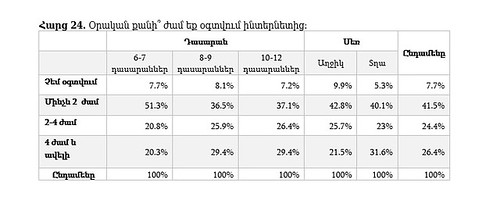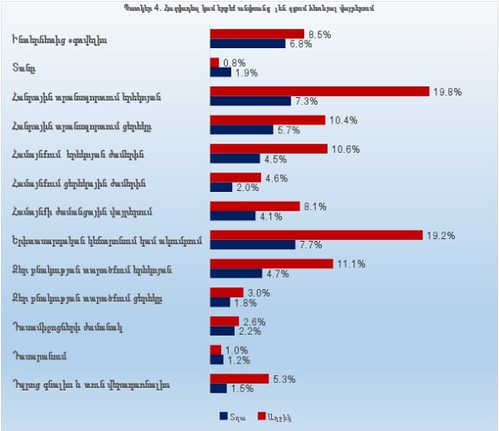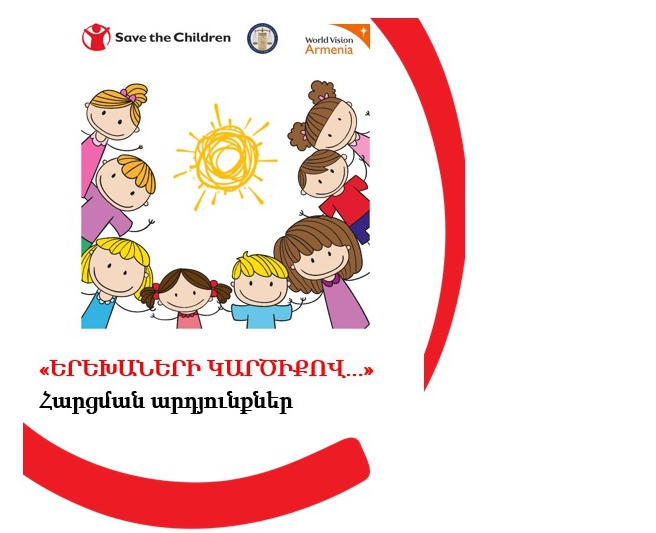The national Young Voices survey, which aimed to make children’s thoughts about their future, surrounding dangers, and rights heard, was recently summed up.
This survey and the research was conducted by the Save the Children Armenia Country Office, in cooperation with World Vision Armenia. The data was collected from Armenia’s 67 schools, involving 10 marzer (provinces) and Yerevan.
The survey was conducted through questionnaires and focus groups among 1,200 children across the country. The Office of the Human Rights Defender of Armenia also participated in developing the questions.
The multiple-choice questions were intentionally tailored to age-appropriate user friendly responses. An attempt was made to avoid direct questions undermining the potential stressful atmosphere, which might lead to obvious limitations of the results.
The researchers also say: “At the same time, the survey was a learning exercise for the children, since in completing the questionnaire, they obtained more knowledge about their rights.”
The Young Voices survey focused questions on safety and violence, psycho-social well-being, children’s rights, the school, and the future.
Also included in the survey were questions on the media sector: 52% of children confessed that they watch two hours of television a day, while 9% watched more than four hours.
Schoolchildren use the internet more often: 41.5% up to two hours, 24.4% from two to four hours; and 26.4% more than four hours.

While 89% note that they know how to use the internet safely. Of these, 64% responded that they learned internet safety skills not in school.
Of the respondents, 84% considered very important that in Armenia, more work should be done to prevent violence.
The issue of safety was observed not only in real life, but also online. It became clear that
- 92% of respondents use the internet at least two hours a day, and 88% know how to use the internet safely.
- 13% of respondents claimed that an adult contacted them online and wanted to talk about personal issues, and 7% claimed they received insulting messages online.
The data on online communication between minors and adults is worrying. About 11% of respondents claimed they had received offensive messages online or on their mobile phones from other children or adults.
“Those issues require close attention both in terms of increasing IT safety awareness among children and more steadfast monitoring and prevention mechanisms by the law-enforcement bodies,” reads the report.

Conditions were created during the Young Voices survey so that children have the opportunity to express their opinions without worrying that their answers may be checked.
This precondition makes the survey results even more interesting, since besides the first layer, the hidden layer also emerges.
In some cases, children’s perceptions and the reality are hard to compare, and there is a need for deeper examination on how stereotypes affect their decision to be sincere.
- 84% of children noted that Armenia needs to put more effort in preventing bullying.
- 38% of the surveyed children have seen a child hit or punched in their community.
- 43% have witnessed bullying in school at least 1–5 times.
- Only 9% reported the incident to the relevant authorities.
- 90% of children responded that they’re not worried about being beaten or experiencing violence.
Combing these results, we can see that almost every second child witnessed violence in school. But at the same time, 90% said that they were not the subject of the violence.
The recently published 2015–16 Demographic and Health Survey (DHS) revealed that 70% of 1–14 year-old children have experienced physical (38%) or psychological (65%) abuse. Whereas, according to the Young Voices survey results, children were not eager to mention that they were subjected to violence.
“It can be assumed that children are unwilling to report on cases of their personal experience, which well correlates with the recognized widely spread reluctance to report on cases of violence among the population in Armenia in general. This brings to the conclusion that violence and bullying are widespread both in schools and communities, but at the same time it is a hidden reality, which needs additional deeper analysis and actions to address the problems of occurrence of and reporting on such,” reads the report.
The survey also showed that children in Armenia are confident around their after-school plans: they have a positive attitude towards the future and know what they will do after graduating from school.
The researchers considered the overall confidence as the most encouraging data, but also noted: “Though it is very diffi cult to measure whether they fully recognize the challenges they will face during the course of adulthood.”
More than 64% of the children responded that they need more opportunities — to affect education and school issues that concern them.
Nune Hakhverdyan







